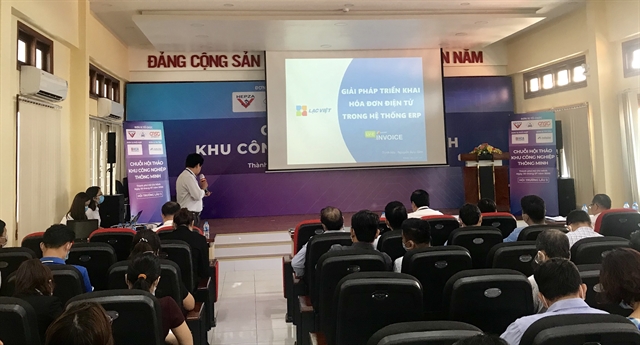Enterprises in export processing zones (EPZs) and industrial parks (IPs) should use high technologies to better manage manufacturing processes and improve commodity quality, speakers said on July 30 at a meeting in HCM City.

Enterprises in export processing zones (EPZs) and industrial parks (IPs) should use high technologies to better manage manufacturing processes and improve product quality.
“We can fully expect a future where everything will be automatic, people's living standards will be higher, and machines will serve instead of human in many functions," Cao Thi Phi Van, deputy director of the HCM City Investment and Trade Promotion Centre (ITPC) said.
Tran Thien Long, deputy head of the HCM City Export Processing Zones and Industrial Parks Authority (Hepza), said the city has set a goal to have all EPZs and IPs being “green, clean and hi-tech” by 2025 and build new hi-tech zones for supporting industries.
Priority will be given to current investors in hi-tech especially those applying the Industry 4.0, and support industries with high value-addition, he said.
Speaking at a meeting on smart industrial parks last week, Lam Nguyen Hai Long, director of Quang Trung Software Park, pointed out that in smart industrial parks, everything will be appended to sensors and IoT (Internet of Things) devices, allowing businesses to have a comprehensive understanding about equipment and machines being used in industrial parks.
AI systems will give directions and automatically correct errors of devices. Therefore, daily duties will be solved quickly and operation processes will go smoothly without much interruption.
“In the future, we can also expect robots and humans working together.”
The 4.0 revolution has significantly changed the manufacturing process. Enterprises that want to maintain and develop for a long time will have to enter the technological race to promote their production models, he noted.
Smart industrial parks can offer enterprises competitive advantages as everything is automatic and digitised. Enterprises can easily control an entire system with a mobile phone, reducing dependence on labourers. Very few people are needed to operate the model as everything is determined quickly and automatically by computers and AI systems.
Workers’ jobs will consist of operating systems and checking for arising problems. Workers will also have the responsibility of solving complex problems that are beyond the capabilities of computers.
Challenges facing IPs
In HCM City, EPZ and IP infrastructure, mostly built in the 1990s, has deteriorated, especially wastewater treatment facilities, with a number of central wastewater treatment systems found to have violated environmental regulations.
Many companies seeking to expand cannot find enough land for lease, and rentals are priced too high compared to EPZs and IPs in neighbouring provinces.
In addition, roads near EPZs and IPs are often overloaded, leading to higher production costs for tenants and limiting their competitiveness.
Other problems include lack of schools, accommodations and medical facilities for workers and their families, experts said.
The limited availability of skilled IT and management personnel is another problem.
To address these issues, administrative procedures related to investment, labour and construction in EPZs and IPs need to be simplified to attract foreign investment. The quality of life and working environment for workers also must be improved, experts said.
The meeting also presented more than 20 technology products and solutions for production, management and business activities at IZs and EPZs in HCM City.
The event was held as part of a series of smart industrial park workshops by ITPC, HCM City Export Processing and Industrial Zones Authority (HEPZA), and Quang Trung Software Park. — VNS





